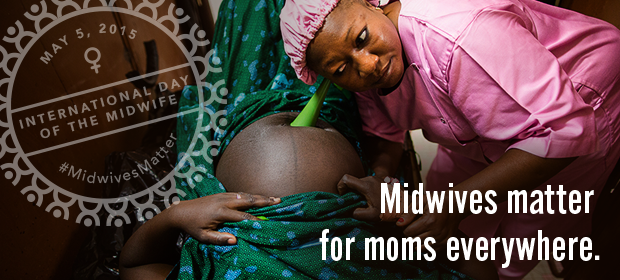Where We Work
See our interactive map


“Midwifery is not just about caring for pregnant women and delivering babies,” Mrs. H. told us.
I can still hear these words from my first day in midwifery school over two decades ago, spoken by my midwifery tutor.“By the end of your training you will have knowledge and skills to be educators, social workers, and counselors,” she said.
“You will have extra ears and eyes, possess a sixth sense, a gut instinct to be able to make decisions on your feet and take quick action. You will take your patients’ joys, fears, and frustrations with a smile. You will love and be proud to be a midwife.”
Patients forget the labor pain, but they never forget a good midwife.
The need for skilled midwives has expanded a lot over the years since my midwifery training and practice. Changes in global health, including the emergence of HIV, have taken their toll on young women of childbearing age more than any other population groups. Tuberculosis, noncommunicable diseases such as diabetes, and obesity also affect pregnancy.
Unfortunately, just when we need these health workers more than ever, the world is experiencing a shortage of midwives.This shortage is worse in low- and middle-income countries, where attrition among midwives is high, particularly in rural areas. The reasons are many. Midwifery schools are closing in some countries. HIV and other diseases, such as the ongoing Ebola epidemic, are claiming the lives of midwives and affecting the demand for midwifery training.
Mrs. H. taught from personal experience. She had, during her four pregnancies, experienced all the major pregnancy-related complications: pre-eclampsia, prolonged labor, post-partum hemorrhage, the need for a caesarian section—all major risks for and causes of maternal death.But she survived to tell the stories because she had access to trained midwives.
Mrs. H. always ended her teaching sessions with these words: “If it was not for my midwife, I would not have lived to have another child. Patients forget the labor pain, but they never forget a good midwife.”
We always thought she exaggerated. But today I know that it takes a midwife to identify high-risk pregnancies, to take prompt action, and to provide specialized services related to pregnancy and childbirth.
Midwives could avert almost two-thirds of maternal and newborn deaths and debilitating conditions.
The world needs more midwives to reduce preventable maternal deaths, to prevent debilitating reproductive health conditions such as obstetric fistula, to achieve an AIDS-free generation, and to give every newborn a chance to reach adulthood and be a productive citizen.
Universal health coverage cannot be equitably achieved unless all women have access to midwives who have the right skills, attitudes, support, and equipment to provide high-quality care before, during, and after pregnancy and childbirth, and throughout every woman’s reproductive life cycle.
The data in the State of the World’s Midwifery report speaks for itself. For instance, midwives could deliver 87% of the world’s sexual, reproductive, maternal, and newborn health services and avert almost two-thirds of maternal and newborn deaths and debilitating conditions.
Yet only 25% of trained providers of midwifery services meet the competencies outlined by the International Confederation of Midwives.
Investing in competent midwives and other health workers with midwifery skills will require political will and the realization that midwives—the vast majority of whom are women—and women in general contribute greatly toward our progress in attaining our global development goals.
Midwifery professional associations need to raise their voices and advocate for more competent midwives, as well as the changes it will take to produce and retain them. And to lead policy changes, develop standards, and arrange for midwives to share selected tasks with other health workers.
Midwives can serve as leaders, teachers, and mentors.
Pregnancy and childbirth are, for better or worse, life-changing events in any woman’s life, and in those of her family and community. Every woman deserves access to safe, acceptable, effective reproductive health, pregnancy, and childbirth care—including in underserved areas where poverty makes women and their families vulnerable to maternal and child mortality and morbidity.
As a midwife—on this International Day of the Midwife—I salute all midwives who are practicing on the front lines, as well as the few midwifery educators who are striving to meet the demand for competent midwives.
You all stand out, for good midwives will always be remembered by their clients!
Get the latest updates from the blog and eNews




